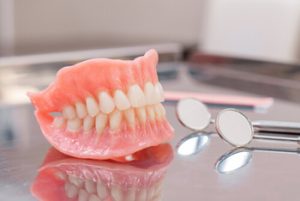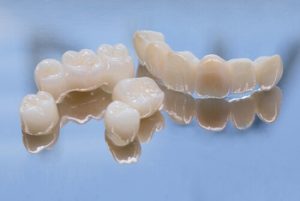Do you know how to remove tartar from dentures instantly? Keeping dentures free from tartar is essential for comfort, confidence, and ongoing oral health. Many denture wearers struggle with stubborn deposits that don’t go away with standard cleaning. Acting quickly to clear tartar from dentures helps preserve comfort, freshness, and the look of your smile every day.
What Causes Tartar to Form on Dentures?
Tartar can build up quickly when plaque is not removed regularly. Understanding its origin helps prevent future issues and supports more effective cleaning strategies.
 The Link Between Dental Plaque and Tartar Buildup
The Link Between Dental Plaque and Tartar Buildup
Tartar begins as a sticky biofilm known as plaque that clings to the denture surface. When left uncleaned, this film hardens into dental calculus or tartar. Once hardened, it becomes more difficult to remove without professional cleaning or targeted methods. Plaque buildup acts as the base layer for tartar formation and often collects near metal components or between denture teeth. Identifying early signs like dullness or rough patches is key to avoiding hardened tartar.
Why False Teeth Are Still at Risk
Even though dentures are not natural teeth, they are still vulnerable to similar issues like tartar buildup and gum inflammation. Food particles and bacteria can stick to dentures just as they do to enamel. If not cleaned thoroughly, this buildup can contribute to oral health concerns such as bad breath or even gum disease around remaining natural teeth. Maintaining dentures properly is just as important as brushing real teeth.
How Tartar Affects Denture Comfort and Function
Tartar on dentures can create discomfort when eating, lead to sore spots, or cause irritation on the gums. It may also alter the fit of the denture if buildup occurs along the denture base. Some people also notice increased bad breath or a change in how their dentures look. Removing tartar buildup regularly supports a better overall fit and improves oral hygiene.
Safe Ingredients That Break Down Tartar Quickly
Using the right household ingredients can help soften tartar and remove plaque from dentures effectively. These methods offer quick results when used properly.
Can Baking Soda Remove Plaque from Dentures?
Yes, baking soda is a gentle and natural option to help loosen hardened plaque. A baking soda solution made with warm water can reduce surface roughness while being kind to the denture material. Applying a small amount of the paste using a soft-bristled toothbrush allows targeted plaque removal. Many find this to be an affordable and effective option for mild tartar deposits. When used as part of a consistent cleaning routine, baking soda helps prevent tartar buildup.
Will Vinegar Damage Dentures?
There is some concern about vinegar damage to dentures, particularly if they contain metal components. A diluted white vinegar solution can be used safely for short periods. It helps soften tartar and makes it easier to remove with a denture brush. Always rinse thoroughly with warm water after soaking to protect the integrity of the denture. To avoid risk, do not soak overnight or for more than 30 minutes.
The Role of Hydrogen Peroxide
Hydrogen peroxide can be used to disinfect dentures while also aiding in tartar softening. When combined with baking soda, it enhances the cleaning effect without the need for harsh scrubbing. It also supports plaque removal and reduces bacteria responsible for gum diseases and odour. Limit use to a few times per week and avoid prolonged soaking. This method is especially helpful when aiming to clean dentures quickly and thoroughly.
Tools and Techniques for Instant Results
Cleaning dentures thoroughly relies not just on the ingredients used but also on the tools and actions that support their effectiveness.
Using a Soft Bristled Toothbrush or Denture Brush

Choosing a Non-Abrasive Denture Cleaner
Non abrasive denture cleaner tablets are formulated to lift stains and reduce hardened plaque without damaging the denture acrylic. They can be especially helpful when used as part of a daily cleaning routine. Most work within 15 minutes and complement manual brushing. Look for formulas that are suitable for both full dentures and partial dentures to ensure compatibility with your appliance.
Rinsing with Warm Water After Every Meal
A warm water rinse can clear away early plaque formation, making daily denture cleaning more effective and less abrasive. This simple habit also helps dislodge food particles and reduce the risk of bacterial growth. It is a quick and easy way to support consistent cleaning routines without needing to brush after every snack. Make it a habit whether at home or on the go.
Natural Methods for Those Looking for Gentle Options
Some denture wearers prefer natural solutions that avoid chemicals and support long-term care.
Using White Vinegar to Soften Tartar
White vinegar works by softening hardened plaque so that it can be brushed away with less effort. Soaking dentures in a 50/50 vinegar and water mix for 20 to 30 minutes may loosen buildup on the denture surface. This is particularly useful for those with removable dentures who prefer gentler options. Be sure to rinse thoroughly to remove the sour taste and any residual vinegar.
How to Clean Dentures Using Natural Solutions
Stir baking soda into a small dish of water until thickened slightly, then use a soft brush to remove stubborn build-up from your dentures. Avoid rubbing too hard, especially near any partial plate attachments or fragile denture frames. Use this method 2 to 3 times a week to help manage tartar formation. It supports both freshness and oral hygiene without damaging the structure.
Cautions Around Homemade Remedies
While natural methods are useful, they should not replace professional cleanings or routine dental visits. Always check with your prosthetist before trying new approaches, especially if you have sensitive gums or wear dentures with metal fixtures. Using harsh chemicals or abrasives can affect how well dentures fit. Stay cautious with DIY treatments that claim to remove tartar buildup instantly without proper testing.
The Importance of Long-Term Care and Prevention
Removing tartar is only part of the solution. Preventing future buildup starts with smart habits and proper denture maintenance.
Staying Ahead with Consistent Cleaning Routines
Daily denture cleaning helps prevent tartar formation and supports a healthier mouth. Make it a habit to soak, brush, and rinse dentures after meals and before bed. Regular cleaning helps keep your gums healthy and your dentures free from unpleasant odours. Replacing old denture cleansers regularly also ensures continued effectiveness. Prevention is more manageable than correcting hardened buildup.
 Why Oral Hygiene Still Matters with Dentures
Why Oral Hygiene Still Matters with Dentures
Even those who no longer have natural teeth should continue to focus on oral hygiene. Plaque from dentures can still affect the gums, tongue, and any remaining teeth. Gum disease is still possible, particularly near areas with remaining teeth or around the lower jaw. Good oral care helps reduce risk and improves comfort while wearing dentures.
When to Schedule Professional Cleanings
While home care is important, professional cleaning is recommended every six months. Your prosthetist can spot areas you might miss and remove plaque from dentures instantly using specialised tools. These visits also allow for inspection of denture wear and fit. If you experience discomfort or notice visible tartar, early treatment prevents bigger issues later.
Ready to Keep Your Dentures Tartar Free?
Tartar buildup does not have to be a permanent problem. With the right cleaning habits, gentle ingredients, and regular checkups, it is possible to remove tartar quickly and maintain fresh, clean dentures every day. Whether you are using a vinegar solution, baking soda, or a non-abrasive denture cleaner, the key is consistency and care.
For further support or a thorough denture cleaning, contact our clinic at (07) 5317 1023 or (07) 5315 8076 and take the next step toward fresher breath and a more comfortable fit.
References
https://www.colgate.com/en-in/oral-health/dentures/how-to-clean-dentures-to-avoid-bacteria-buildup
https://my.clevelandclinic.org/health/articles/10901-denture-care


 The Link Between Dental Plaque and Tartar Buildup
The Link Between Dental Plaque and Tartar Buildup Why Oral Hygiene Still Matters with Dentures
Why Oral Hygiene Still Matters with Dentures


Recent Comments